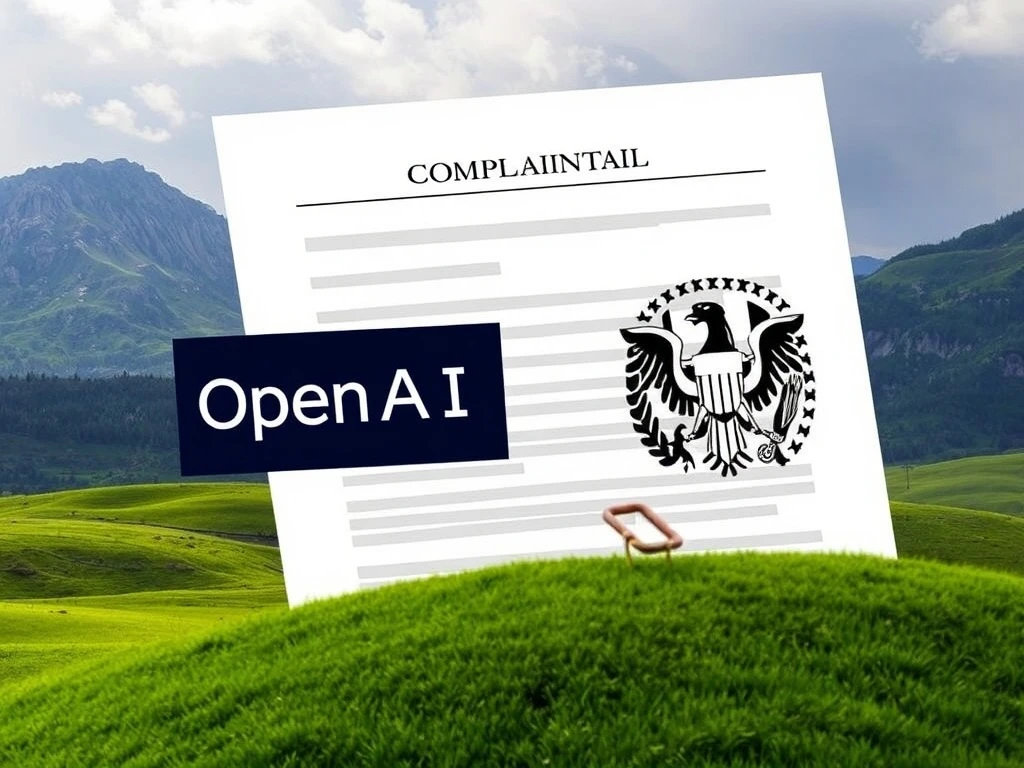Urgent: OpenAI Faces IRS Complaint Over Alleged Tax Violations

For those tracking the intersection of technology, regulation, and significant players like OpenAI, recent news brings a notable development. ChatGPT maker OpenAI is now facing scrutiny from the US Internal Revenue Service (IRS) following a formal complaint. This situation raises questions about the company’s structure and compliance, particularly concerning its nonprofit foundation and alleged tax violations.
Understanding the IRS Complaint Against OpenAI
The complaint against OpenAI was filed by the Midas Project, an artificial intelligence watchdog group. On Thursday, the Midas Project announced it had submitted findings to the IRS alleging potential tax law violations by OpenAI that could jeopardize its nonprofit status. The core of their accusation centers on what they describe as “abandoned safeguards, rife conflicts of interest, financial upside for the CEO if the organization goes for-profit, and even potential misuse of charitable funds.”
The Midas Project, founded in early 2024, positions itself as a nonprofit initiative dedicated to monitoring leading AI companies to ensure the technology benefits everyone. Their investigation into OpenAI has culminated in this significant complaint to the US tax authority.
Alleged Conflicts of Interest and Nonprofit Status
A central point of the complaint revolves around OpenAI’s structure and the roles of its leadership. The Midas Project alleges that the company’s board structure fosters conflicts of interest that violate federal rules governing tax-exempt non-profits. Specifically, CEO Sam Altman’s dual role as both CEO of OpenAI’s for-profit operations and a board member of its nonprofit is highlighted as creating situations where he could personally benefit at the nonprofit’s expense.
The complaint suggests that Sam Altman stands to receive equity in a future for-profit OpenAI entity, potentially valued in the billions. Furthermore, his existing investments in companies that partner with OpenAI are cited as creating additional conflicts, potentially worth hundreds of millions.
Beyond the CEO, the complaint also identifies other board members with potential financial conflicts:
- Bret Taylor (Chairman): Co-founded Sierra AI, a company that resells OpenAI’s models.
- Adam D’Angelo: His company, Quora, is a customer of OpenAI.
- Adebayo Ogunlesi: His firm, Global Infrastructure Partners, owns data centers that profit from the demand for AI infrastructure.
OpenAI was initially established in 2015 as a nonprofit by Elon Musk, Sam Altman, and others, with the stated mission to ensure advanced general intelligence benefits humanity. The Midas Project argues that any weakening of this original structure and its protections, especially as the company pursues powerful AI systems, puts the public interest at risk. They urge the IRS to investigate to preserve OpenAI’s duty to humanity.
Restructuring Plans and the Elon Musk Connection
The context for this complaint includes OpenAI’s recent considerations regarding its structure. Last November, the AI firm reportedly entered preliminary discussions with US regulators about potentially transforming into a for-profit structure. While reports in May indicated these plans were abandoned and the commitment to nonprofit status reaffirmed, no final decisions on restructuring have been announced.
This situation is further complicated by the ongoing legal disputes with co-founder Elon Musk. Musk, who initially advocated for OpenAI to become for-profit in 2017, later sued the company in March and again in August 2024. His lawsuits allege that OpenAI violated their original agreement as a nonprofit venture and abandoned their mission in pursuit of profit. Musk’s attempts to influence or acquire the company, including a reported $97.4 billion bid rejected by Altman in February, underscore the tension surrounding OpenAI’s direction and financial structure.
Why This Matters for the Tech and Crypto Community
While primarily focused on AI, the regulatory scrutiny faced by a major tech player like OpenAI resonates within the broader technology and investment landscape, including the cryptocurrency space. Regulatory actions by bodies like the IRS against prominent entities set precedents and highlight increasing oversight on innovative sectors. Discussions around corporate structure, nonprofit vs. for-profit models, and conflicts of interest are relevant across various tech industries, including those building on blockchain technology.
What’s Next?
The Midas Project has formally requested the IRS investigate their allegations. The outcome of this investigation could have significant implications for OpenAI’s organizational structure, its tax status, and potentially its future operations and funding. The company has not yet publicly responded to the complaint as of the time of reporting. The tech world will be watching closely to see how the IRS proceeds and what findings emerge from any potential investigation into OpenAI’s compliance with nonprofit tax rules and the alleged conflicts of interest.
Summary
OpenAI is facing a serious challenge in the form of an IRS complaint filed by the Midas Project. The complaint alleges significant tax violations and conflicts of interest, particularly concerning CEO Sam Altman’s roles and potential financial gains, as well as other board members’ affiliations. The watchdog group contends these issues threaten OpenAI’s fundamental nonprofit status and mission. Amidst past discussions of restructuring and ongoing legal battles with Elon Musk, this IRS complaint adds another layer of complexity to the future of one of the world’s leading AI companies. The resolution of this investigation by the IRS will be crucial in determining OpenAI’s path forward and its adherence to the principles it was founded upon.









